
The brown-tail moth is a moth of the family Erebidae. It is native to Europe, neighboring countries in Asia, and the north coast of Africa. Descriptions of outbreaks, i.e., large population increases of several years duration, have been reported as far back as the 1500s. The life cycle of the moth is atypical, in that it spends approximately nine months as larvae (caterpillars), leaving about one month each for pupae, imagos and eggs. Larvae (caterpillars) are covered in hairs. Two red spots on the back, toward the tail, distinguish these species from other similarly hairy moth larvae. The winged adults have white wings and a hairy white body with a tuft of brown hair at the tip of the abdomen. Females lay one egg cluster, usually on the underside of a leaf of a host plant. The species is polyphagous, meaning that it feeds on many different species of trees, including pear, apple, maple and oak.
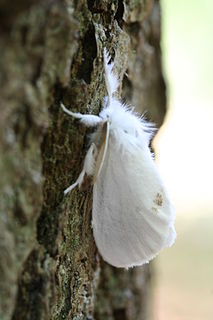
The yellow-tail, goldtail moth or swan moth is a moth of the family Erebidae. The species was first described by Johann Kaspar Füssli in 1775, and has commonly been placed within the related genus Euproctis. It is distributed throughout Europe to the Urals, then east across the Palearctic to Siberia and south to India and Sri Lanka.

Lymantria is a genus of tussock moths in the family Erebidae. They are widely distributed throughout Europe, Japan, India, Sri Lanka, Myanmar, Java, and Celebes. The genus was erected by Jacob Hübner in 1819.

Arna is a genus of tussock moths in the family Erebidae. The genus was erected by Francis Walker in 1855. It contains many species formerly included in the genus Euproctis, such as Arna bipunctapex.
Eloria is a genus of moths in the subfamily Lymantriinae. The genus was erected by Francis Walker in 1855.

Euproctis is a genus of tussock moths in the family Erebidae described by Jacob Hübner in 1819. Species are cosmopolitan, widespread throughout Palearctic, African, Oriental and Australian regions. Molecular phylogenetic studies indicate that the genus as presently understood comprises a large number of unrelated lineages, only a few of which have names, and is therefore in serious need of revision.
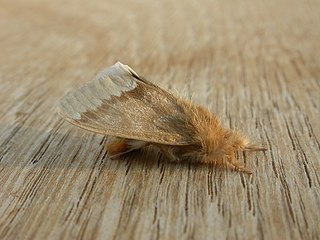
Euproctis baliolalis, the browntail gum moth, is a moth of the family Erebidae. The species was first described by Charles Swinhoe in 1892. It is found in the south-east quarter of Australia.
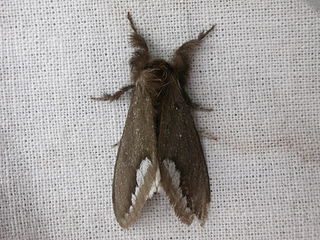
Euproctis limbalis, the bordered browntail moth, is a moth of the subfamily Lymantriinae first described by Gottlieb August Wilhelm Herrich-Schäffer in 1855. It is known from Australia, including Queensland and New South Wales.
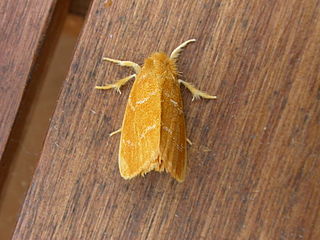
Euproctis lutea, the fresh-water mangrove itchy caterpillar, is a species of moth of the family Erebidae first described by Johan Christian Fabricius in 1775. It is found in northern Australia and New Guinea.
Amsacta marginalis is a moth of the family Erebidae. It was described by Francis Walker in 1855. It is found in Ghana, Malawi, Nigeria, Sierra Leone and Togo.

Dysschema marginalis is a moth of the family Erebidae first described by Francis Walker in 1855. It is found in Venezuela, Ecuador and Colombia.
Euproctis bimaculata is a moth of the family Erebidae first described by Francis Walker in 1855. It is found in India, Sri Lanka and Thailand.
Euproctis flavinata is a moth of the family Erebidae first described by Francis Walker in 1865. It is found in China and Hong Kong.
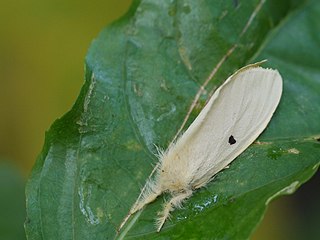
Euproctis lunata, the castor hairy caterpillar, is a moth of the family Erebidae. The species was first described by Francis Walker in 1855. It is found in India, Pakistan, Sri Lanka and Thailand.

Euproctis latifascia is a moth of the family Erebidae first described by Francis Walker in 1855. It is found in India, Sri Lanka and Taiwan.

Euproctis varians is a moth of the family Erebidae first described by Francis Walker in 1855. It is found in India, Sri Lanka, the Maldives, Celebes and China.












